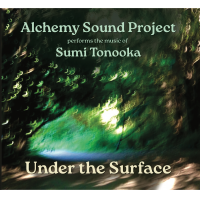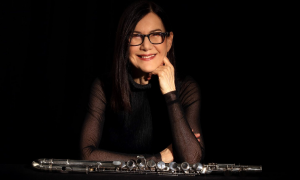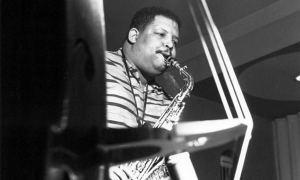Home » Jazz Articles » Interview » A Fireside Chat With Lou Donaldson
A Fireside Chat With Lou Donaldson
We didn't have big contracts back then. They were put together quick, so there wasn't a whole lot of rehearsing and practicing... We would go over and figure out what we were going to play and make the record. They were around six hours and then it was all over.
Some years back, before he passed,
Andy Simpkins
b.1932
Charlie Parker
saxophone, alto1920 - 1955
All About Jazz: Let's start from the beginning.
Lou Donaldson: Well, my mother was a music teacher, piano teacher and I was around music in my childhood. I didn't want to play piano, so she bought me a clarinet and started me on that. I loved the clarinet. I didn't like the piano, but I loved the clarinet.
AAJ: And clarinet made way for the alto saxophone.
LD: When I went into the Navy. I went to college and I was in the marching band, but I just played clarinet. In 1945, I was drafted into the Navy and I got in the Navy band and then I started playing saxophone.
AAJ: Did you enjoy your time?
LD: I loved it. It was the best duty I ever had.
AAJ: That explains a lot and why you seem to play on a lot of ocean liners.
LD: (Laughing) It was great. Then I moved to New York in 1950. I found pretty good work. That was when I was a GI, so I was going to GI school, which helped, helped me out financially.
AAJ: How did you meet Alfred Lion?
LD: Alfred Lion, I was playing in Minton's Playhouse and he came up with somebody and I think they just came up to check me out. Somebody had probably told them about me and I met him up there. He came up and asked me if I could play like Charlie Parker (laughing). He wanted a record date and I said, "Of course."
AAJ: Could you play like Charlie Parker?
LD: I tried to. Back then, everybody was trying to play like Charlie Parker if they played alto and heard him. He was the best. What can I say? He had a different style from everybody that preceded him. He was more bluesy and he was just the best.
AAJ: I don't hear too much of Bird on your sessions.
LD: Well, I had heard too many saxophone players before I heard him. I heard

Johnny Hodges
saxophone, alto1907 - 1970

Benny Carter
saxophone, alto1907 - 2003

Louis Jordan
saxophone, alto1908 - 1975
AAJ: And Lion recorded you on sessions that became the Quartet/Quintet/Sextet record.
LD: Yeah, he set up a date with a group that ended up being the

Modern Jazz Quartet
band / ensemble / orchestrab.1952
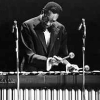
Milt Jackson
vibraphone1923 - 1999

John Lewis
piano1920 - 2001

Percy Heath
bass, acoustic1923 - 2005

Kenny Clarke
drums1914 - 1985

Art Taylor
drums1929 - 1995
Gene Ramey
bass, acousticb.1913
AAJ: You must have made an impression because you were at Rudy Van Gelder's house quite a bit.
LD: Oh yeah, in the early and middle Fifties, I was recording quite a bit.
AAJ: How was the money?
LD: (Laughing) Not too good. We got the scale, but that is more than you would have if you didn't make the record. We didn't have big contracts back then. They were put together quick, so there wasn't a whole lot of rehearsing and practicing and stuff like that. We would go over and figure out what we were going to play and make the record. They were around six hours and then it was all over. They didn't pay no overtime, so you had to make that record within that time period.
AAJ: Blues Walk doesn't sound like it needed overtime.
LD: Well, that's the best one I made. Oh, yeah. It is not a record that you can critique that well because it is perfect. It is a perfect record. What happened was we had a lot of problems, as I've told you before, going over to Rudy's house because back then, most of these young people don't know what was happening, but there was a lot of things that messed up the dates. Cats would act up and a lot of them would have to get their "vitamins" or they couldn't play, so eventually, I got tired of that, so I told them that I was going to pick a group. That is why you see all these guys on this record that never recorded before. I added Ray Barretto on the conga drums to steady down the rhythm because most of the bebop drummers were so busy, the rhythm didn't soak through to the people. Playing nightly in clubs, I knew exactly what to do to get that rhythm right, so I brought in Ray. Ray used to come by and sit in with his conga and we would let him play. The rhythm was much better with the conga added in. That is why we tried him on the date. The record, actually, was a hit record for that time.
AAJ: (I start playing Blues Walk for him) When was the last time you heard this?
LD: Oh, I listen to that. I have it in my car in my CD player. When I am traveling, I listen to it all the time (laughing). Sounds better now than it did then (laughing). They redid it and remastered it and they got it up right. It is a great record, an almost perfect record. I listen to it. It was the epitome of jazz music. I have had people tell me that dance groups use this record to dance. It has got a groove, a nice groove from start to finish and it builds up within the record.
AAJ: And you also recorded with the Three Sounds (Andy Simpkins,

Gene Harris
piano1933 - 2000
Bill Dowdy
drumsb.1933
LD: Yeah, I brought them to New York myself to Blue Note. I met them in Washington and I talked Lion into bringing them into New York and I recorded with them. They sounded good and I knew they were going to be good. I knew they were going to be great. I used to work right across the street from where they played, so we would go over when we weren't playing and they would come over when they weren't playing. We got together.
AAJ: Having played with

Blue Mitchell
trumpet1930 - 1979
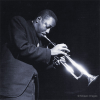
Bill Hardman
trumpet1933 - 1990

Donald Byrd
trumpet1932 - 2013

Kenny Dorham
trumpet1924 - 1972
LD: All of them are about the same. I played with
Tommy Turrentine
trumpetb.1928

Horace Parlan
piano1931 - 2017
George Tucker
bass1927 - 1965

Al Harewood
drums1923 - 2014
AAJ: Your tenure with Blue Note was two part, because after a handful of years, you returned to record one of my favorites, The Midnight Creeper.
LD: Well, that is a great record. See at that time, Blue Note had been sold to Liberty and they had a big record company and they were still operating it, Al Lion and Frank Wolff, but you had big business people in there then and the money got better, but they also wanted a more commercial type music to try to compete with other kinds of music. So it was a little different period then.
AAJ: So until the Eighties you were Mr. Blue Note.
LD: Yeah, except the early part when they had the Dixieland. At first, they just had Dixieland. (Laughing) A lot of people call me that, Blue Note Lou (laughing).
AAJ: How is your health?
LD: My health is all right. I got a little cold right now because I was on a ship for two weeks and I stayed in Florida for one week and when I came back here, I caught a little cold. Other than that, I'm all right. I was playing Norwegian. We went down the coast of Mexico and then to Miami. It was a great trip with a lot of good musicians and my friends that I don't see but once a year.
AAJ: And the future?
LD: Next week, I am playing the Village Vanguard and then I am playing Lincoln Center. I've got enough to do to keep me busy.
AAJ: I'll make some calls to get you recording for Blue Note again.
LD: Well, a lot of people want me to do that. I saw Bob Belden, he is one of the producers, and he said that it was a shame that they haven't made a record with me because they are re-releasing all my old records and they are outselling the ones they're making (laughing). It would be a good idea to call on me again.
AAJ: That's because you're Blue Note Lou.
LD: I hope so. Tell your audience that when they put them out to buy these records because I need the money (laughing).
Tags
Interview
Lou Donaldson
Andy Simpkins
Charlie Parker
Johnny Hodges
Benny Carter
Louis Jordan
Modern Jazz Quartet
Milt Jackson
John Lewis
Percy Heath
Kenny Clarke
Art Taylor
Gene Ramey
Gene Harris
Bill Dowdy
Blue Mitchell
Bill Hardman
Donald Byrd
Kenny Dorham
Tommy Turrentine
Horace Parlan
George Tucker
Al Harewood
Comments
PREVIOUS / NEXT
Support All About Jazz
 All About Jazz has been a pillar of jazz since 1995, championing it as an art form and, more importantly, supporting the musicians who make it. Our enduring commitment has made "AAJ" one of the most culturally important websites of its kind, read by hundreds of thousands of fans, musicians and industry figures every month.
All About Jazz has been a pillar of jazz since 1995, championing it as an art form and, more importantly, supporting the musicians who make it. Our enduring commitment has made "AAJ" one of the most culturally important websites of its kind, read by hundreds of thousands of fans, musicians and industry figures every month.






 Buy Now
Buy Now




